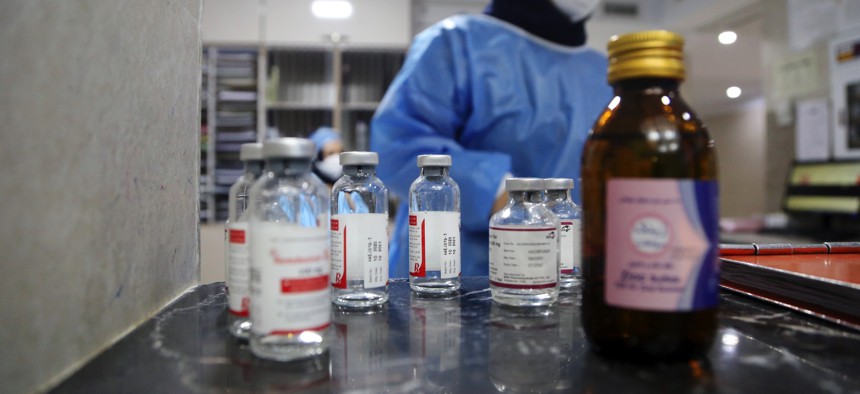The following piece was published in Defense One and was written by NIAC Policy Director, Ryan Costello
Thursday’s furlough of Iranian-American dual nationals unjustly detained in Iran appears to herald another multistep U.S.-Iranian prisoner-swap deal. According to reports, the United States will unfreeze nearly $6 billion that had been held under U.S. sanctions in a South Korean bank and allow it to be deposited into a Qatari bank. The Qatari government will then oversee Iranian requests to use the funds to purchase food and medicine, which are non-sanctionable goods. While critics are already crying foul, such an arrangement is a smart use of leverage and a win-win for the people of Iran and the United States.
Underlying these complicated diplomatic maneuverings is a perverse and entirely preventable reality: life-saving medicine has become increasingly unavailable in Iran, even as billions of dollars in Iranian assets sit frozen in banks across the globe. From specialized medications to treat blood diseases and cancer, to more basic items like cough syrup and antibiotics, drugs that so many around the world take for granted are desperately needed by Iranians. Some 170 to 180 types of medications are scarce now, a number that is likely to grow, according to Hossein Ali Shahriari, who leads the Parliament’s Health and Treatment Commission. Desperate patients are paying high prices, sometimes traveling long distances, and increasingly turning to the black market to obtain their medicine.
Sanctions are not the only reason that medicine is increasingly scarce, but they are the primary cause. By restricting access to the banking system and hard currency, the sanctions are preventing Iran from obtaining medicine and raw materials to produce many drugs domestically.
This hasn’t always been the case. The brief period in which the 2015 nuclear deal was implemented brought a sharp reduction in medicine shortages. But this changed after Donald Trump withdrew from the deal and sought to impose “maximum pressure” on Iran. In 2018, sanctions expert Elizabeth Rosenberg noted: “What’s different is that the U.S. has reimposed the sanctions it lifted pursuant to the nuclear deal and it has layered on many more, including doing things like designating some Iranian financial institutions not previously designated and that were previously used to facilitate food, medicine and medical imports.”
Corruption and sanctions are inextricably linked: academic literature on sanctions on diverse countries including Iraq, Yugoslavia, Haiti, and Iran all indicate that sanctions expand the shadow economy and incentivize the state to engage in corruption and smuggling in sanctioned goods. As the Global Initiative Network wrote in a report on Iran’s shadow economy, “for criminal networks and state actors, sanctions represent an opportunity to generate huge revenues, which in the case of the state is used to prop up the economy, pay patronage networks and support various proxies in the region.”
Networks linked to the Islamic Revolutionary Guard Corps in particular have benefited from sanctions-created scarcity. Cross-border smuggling operations that netted an estimated $12 billion per year before the nuclear deal are thought to be generating far more today. Additionally, the gaming of differing government exchange rates by corrupt actors helped drive a shortage of insulin in 2020.
All this puts U.S. policymakers in a difficult position. Sanctions ostensibly targeting the Iranian state fail to harm the well-connected elite, who find new ways to profit through the shadow economy. But ordinary people are hit doubly: first by the impact of sanctions on the economy as a whole, and second by predatory smuggling networks that raise the price and lower the availability of medicine and other key goods like medicine.
Releasing frozen funds to alleviate shortages of medicine is a smarter way to put pressure on the Iranian government. Deprived of sanctions as a scapegoat for the scarcity, Iran’s leaders must alleviate it promptly or risk renewed mass outrage from its citizenry.
Moreover, Congressional sanctions on Iran all include explicit exemptions for humanitarian trade. Sec. 1245 of the FY12 NDAA, targeting Iranian oil sales, explicitly says “The President may not impose sanctions…with respect to any person for conducting or facilitating a transaction for the sale of food, medicine, or medical devices to Iran.” By Congress’ own direction, Iran’s restricted funds should be permitted to be exchanged for humanitarian purchases.
Even if other elements of the mutual de-escalation are weighed down by poisonous politics in Washington and Tehran, Biden would be doing right by U.S. interests to free up Iran’s frozen assets for humanitarian purchases and secure the release of Iranian-Americans detained in Iran. In pushing the Trump administration to open up humanitarian channels with Iran during the COVID-19 pandemic outbreak, Biden rightly said, “Whatever our many, many disagreements with the Iranian government, it’s the right and the humane thing to do.”
The same is true with helping Iranians secure medicine amid massive shortages today. Sanctions relief is the right and humane policy to pursue.
